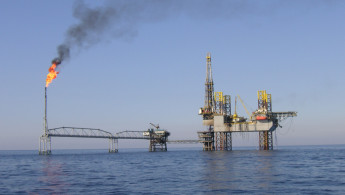Fears of 'all-out energy war' in Middle East amid Israel threats on Iran oil
The Middle East region could see itself dealing with an all-out war on energy, due to Israel’s expected attack on Iran.
Iran launched missile attacks on Israel earlier this month in revenge for the killing Hassan Nasrallah and Ismail Haniyeh, who was killed by Israel in Tehran.
Fears have mounted that Israel will strike Iran's oil facilities, which could potentially impact global oil prices, including in the US. This could in turn affect the outcome of the upcoming presidential election, as voters often take petrol prices into account.
Last week, when asked whether he would support Israeli attacks on Iran's oil infrastructure, US President Joe Biden responded: "We're discussing that. I think that would be a little... anyway."
Days later, Biden cautioned Israel against carrying out any strikes on Iran’s oil facilities, saying if he were in Prime Minister Benjamin Netanyahu’s shoes, he’d "consider alternatives".
Former President and current Republican nominee Donald Trump, however, had a contrasting response during a rally in North Carolina, and suggested that Tel Aviv should hit Iran's nuclear sites.
On Thursday, US website Axios reported that Biden and Netanyahu have "moved closer” to an understanding of what will Israel’s retaliatory strike against Iran would entail, citing US and Israeli sources.
It still remains unclear whether Israel will strike Iran's oil facilities, though an Israeli official told the US website that "current plans are still a bit more aggressive than the White House would like".
Meanwhile, a US official said that Washington is "moving in the right direction", while another official said the administration "was a little less nervous about Israel's plans after the call".
Until now, Israel has used the words "severe" and "symbolic" to describe its anticipated attack on Iran.
The Iran-Israel rivalry has intensified amid Tel Aviv's year-long military operation in Gaza, as well as its escalated aggression and invasion of Lebanon.
Iran backs both Hezbollah and Hamas, the groups Israel says it is seeking to "eradicate" from Gaza and Lebanon, as it pounds the territories.
Concerns are also rising as Tehran-backed Iraqi militias, who have also been involved in Israel’s war in Gaza and tensions in the Middle East, have threatened "an energy war" should Israel attack Iran.
It come after a senior official from Iraq’s Popular Mobilisation Units (PMU) said earlier this month that "not a single drop of oil and gas will leave the Middle East if there is a war. Winter is near for Europe".
Kataib Hezbollah, the Iran-backed Iraqi Shia paramilitary group, echoed the PMU’s warning on Thursday, threatening to "deprive the world of 12 million barrels of oil a day", as cited by Shafaq News.
"We reiterate that any targeting against our country Iraq, or the use of its land and skies to target the Islamic Republic [of Iran,] Kata'ib Hezbollah's response will not be limited to the Zionist entity, but will hit America's bases, camps and interests in Iraq and the region."
"In principle, we do not want to start an energy war, but if it starts, the world will lose 12 million barrels of oil per day, and this is what we will take care of with Almighty God's help. As for what the Yemeni brothers [Houthis] will do in Bab Al-Mandab Strait, as well as what the Iranian brothers will do in Hormuz Strait, God knows best."
The group acts as part of the self-styled 'Axis of Resistance', an alliance of Iran-backed groups confronting US and Israeli influence in the region.
Gulf countries are also involved in this escalation. Qatar, the UAE and Saudi Arabia are reportedly lobbying the US to prevent Israel from hitting Iran’s oil sites, Reuters reported on Thursday.
This comes amid concerns that should Israel attack Tehran’s facilities, their oil fields "could come under attack" from Iran’s allies, notably Yemen’s Houthi rebels.
In a bid to avoid getting caught in the crossfire, the Gulf countries have closed their airspace to Israel in case of an attack on Iran.
Iran reportedly urged its Gulf neighbours to use their influence with the US in anticipation of a vicious Israeli attack.
Moreover, Iran warned Saudi Arabia – with whom it reconciled last year – that it could not guarantee the safety of the Gulf kingdom's oil facilities if Israel was given any assistance in carrying out an attack, a senior Iranian official and an Iranian diplomat told Reuters. It has been long-rumoured that Saudi Arabia and Israel are on the verge of normalising ties, though Israel's war in Gaza has allegedly put such a deal on hold.
These threats highlight the fragility of energy prices and availability amid geopolitical conflicts, which has already been demonstrated by the increase of oil and gas prices triggered by Russia’s invasion of Ukraine over two years ago.
Gulf countries are some of the biggest exporters of oil worldwide, and enjoy good diplomatic relations with the US, while the UAE and Bahrain have normalised ties with Israel.




 Follow the Middle East's top stories in English at The New Arab on Google News
Follow the Middle East's top stories in English at The New Arab on Google News

![A group of Palestinians, foreign and Israeli activists gather to participated in an olive picking event on the land in the town of Battir, which is under threat of confiscation by Israel in Bethlehem, occupied West Bank on 8 November 2024. [Getty]](/sites/default/files/styles/image_330x185/public/2182930803.jpeg?h=199d8c1f&itok=__0LgGsa)
